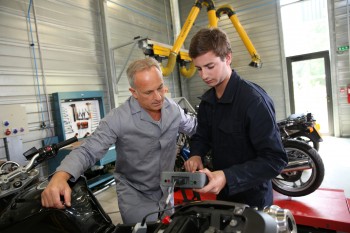There is more than one path you can take to become an automotive engineer. Everyone thinks you need to get a degree in automotive engineering to get yourself right into an automotive job. While this is the focused path to becoming an automotive engineer, there are other, much more flexible ways that anyone can get themselves into an automotive career. Automotive engineering is a fast, competitive industry but the salary and indirect perks of the job can be very rewarding. If you are just starting out on your quest to get into the automotive industry, or are an engineer looking for an awesome change let us help you achieve your goal. Here at Automotive Engineering HQ we will discuss a few different paths on how to become an automotive engineer. We have laid out the most common path below.
High School – the foundation:
Those growing up with automotive passion are probably figuring out how to become an automotive engineer around high school. In high school you must have a main focus on your science and math subjects. You don’t have to truly love math or physics to get into engineering, but you should have a basic knack for the scientific subjects. After all, these are what you will base your automotive knowledge on as you move on in your career. Keep in mind, good grades are a must to get into engineering school.
You should apply to a few engineering schools and take some time to visit and learn about their programs. Don’t think that you need to get into MIT or Harvard to get into automotive. Just make sure that the program you choose has a good reputation and accreditation in your engineering subject. Your objective should be to learn as much as you can, and you don’t need an Ivy league education to do that. Most of the engineers I have worked with went to medium-size private or state universities. Go to a school that you are comfortable with, and where you can learn the most.
High School tips for success:
- Math is your foundation; physics is your focus. Learn as much as you can about these.
- Ask your parents if they can teach you to change the oil on a car. This is a great beginner’s task and is a great way to gain familiarity with a vehicle. (If your parents don’t know how, just search for it online by the make and model of your vehicle; its easier than you think!
- Start taking notes on all the details and mechanics that go into your car.
- Watch Top Gear on BBC – This fun show gave me the love of cars that I have today – I promise you will like it.
College Education – your best asset:
High school is your foundation for these skills, but once you get to college these courses go into overdrive. An engineering degree is critical for becoming an automotive engineer (duh), but you should look and see which branch of engineering you want to go into. The most common degree for automotive is mechanical engineering. While it does not necessarily show you how to become an automotive engineer, this major will cover the basics of mechanics, fluid dynamics, thermodynamics, and high level math. Your studies consist of how the physical world works and is great for anyone who wants to learn about mechanical systems. If you were that kid who always took things apart, or played constantly with Legos, this is the major for you.
Certain Automotive Engineering Courses are very important for setting yourself up for a great career in automotive.However, you do not have to go the mechanical path to get into automotive. If you find you are better at another discipline, or that mechanics are not that interesting, definitely try another route. . Electrical, software, and chemical engineers are found throughout automotive engineering, and although fewer in number, they are a crucial presence in the field. Also, there are more specific disciplines like systems and materials engineering that can really get you into a great specialized job. These are highly sought after positions and are a great niche to get into. The good thing about
Automotive Engineering Courses are very important for setting yourself up for a great career in automotive.However, you do not have to go the mechanical path to get into automotive. If you find you are better at another discipline, or that mechanics are not that interesting, definitely try another route. . Electrical, software, and chemical engineers are found throughout automotive engineering, and although fewer in number, they are a crucial presence in the field. Also, there are more specific disciplines like systems and materials engineering that can really get you into a great specialized job. These are highly sought after positions and are a great niche to get into. The good thing about
any of these engineering degrees is that you have your choice after college of entering any related field, not just automotive. (But trust me – Automotive is the best!)
Every field of engineering is very hard and will require a lot more work than your average degree. However the reward will most likely be a high paying job in a high demand field. There will be moments where you feel like you are trying to learn everything there is about the universe, but stick with it and you will be ahead of the game in the job market.
Focusing on your course work is important, but don’t stop there! Doing an extracurricular automotive activity will get you on the fast track to becoming an automotive engineer. There are many programs out there such as Baha Club, automotive mechanics clubs, and many others. Some activities like the Supermilage Team, where students develop a car that gets over 1000 MPG, really get you noticed by the automotive community. Joining programs like this gives you a huge leg up when it comes to getting into an automotive career.
The other must-have piece of experience is an internship. You must focus on getting an engineering internship while you are still in college. An automotive engineering internship position will make you golden. Working as an intern in the automotive field shows that you have experienced what it is like in this industry, and that you have what it takes to make it as a full time engineer.
Tips for College:
- Get good grades – should be obvious but the automotive world is very competitive.
- Make sure to take electives that focus on design, tolerance, manufacturing and quality. Courses that focus on statistical process control are also critical.
- Do at least one club focused on automotive – this will really help you later on.
- Apply for automotive internships in college.
- Think about what you can do in college that would be great to talk about during an interview – another reason the clubs are important.
- Check out our guide on the 5 most important college experiences for future automotive engineers.
Getting your masters (optional):
If you have your bachelor’s and know you want to get deep into automotive, one option is to go out an get your master’s. Here you should focus solely on Automotive Engineering or a direct interest of yours, like acoustics or materials. There are very good Automotive Engineering Schools all over the US. An automotive masters degree is almost a guarantee that you will be able to land a great job after school!
Landing the Job
 If you want to become an automotive engineer and are a recent graduate, entry level engineer or in another engineering field altogether, you are already on your way. There are several things you can begin to focus on now that you have your foundation established.
If you want to become an automotive engineer and are a recent graduate, entry level engineer or in another engineering field altogether, you are already on your way. There are several things you can begin to focus on now that you have your foundation established.
For recent grads and entry level engineers, you should begin to apply to positions within the automotive industry. What you apply to should be up to the quality of education and grades that you received. I can tell you from experience, applying directly to an OEM is very difficult. It may only result in a contract position initially since you have no work experience. However, these contract positions are huge resume builders and usually result in getting a great position afterword, either at the OEM or at a supplier. Another good path is to apply to a tier 1-3 supplier job to build experience in the industry. There is a large work culture difference between a large automotive company and a smaller supplier and you may find that you like the automotive supplier job better (like me!).
For where to apply, sites like Indeed and Monster are good routes. However, to get faster results, it is wise to see how each company does their hiring. Many automotive companies use recruiting firms to do their hiring. These recruiters act as gate keepers for the internal HR departments. Do some research and find out who does the hiring, and then apply directly to the recruiter. This will help your name get in faster, and will help you build a relationship with an automotive recruiting company. These recruiting firms usually have several different automotive companies as clients. Even if you do not get the job, you will now be in their database and be considered for other opportunities in the future.
If you are looking for what to put on your resume, sign up for my email list to receive our free guide – 5 Things You MUST Include in Your Automotive Engineering Resume.
If you are in a different field of engineering, you may already have the necessary experience to translate into the automotive world. I am often asked how I got into automotive engineering. For me, it was not a direct focused path but a series of small decisions I made along the way that got me into the field. I went to school for mechanical engineering and did a basic path. When I got out of school, I didn’t start right away with an automotive job. I actually started the electrified rail industry. However, it was here that I realized I wanted to join a more dynamic field and automotive was always my interest. Even if you absolutely want automotive, it is okay to take a job in any industry to find out what you like an what you are good at. The key is focusing on the skills in college or your entry level position that will translate well into automotive.
Tips for landing your first job in automotive engineering:
- Apply, Apply, Apply – Focus on automotive suppliers and OEM positions and see what opportunities are out there.
- Focus on the skill set that can be applied to getting a job as a Design Engineer, Quality Engineer, or Manufacturing Engineer.
- Research the the companies and see if they use an HR recruiter.
- Apply to a position directly through the recruiter to be more effective, and build a relationship with these firms.
- Learn the most important Automotive Engineering Terminology.
- If you are in another engineering field, look for skills and projects that translate well into automotive.
- Make sure your resume is well written and has good related experience.
Be sure to keep checking back into this site for more information on how to become an automotive engineer. We also have great inside information on the automotive industry and how to thrive when you get in. Good luck!
This is the most common path to take, however there are many automotive engineers who did not go this traditional route. Let us know in the comments how you became an automotive engineer.


Comments 6
Can you do automortive engineering without physics
I love automobiles
Iam Inspired by this page
I won’t give up on cars so easily
I Fucking Love automotive engineering
if you lack in school work and you have the potential for automobile engineering . what must you do ?